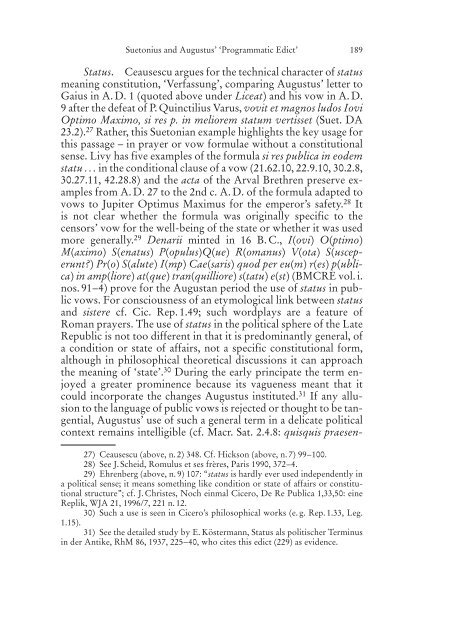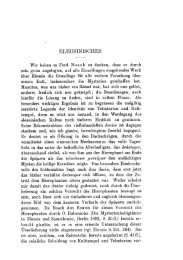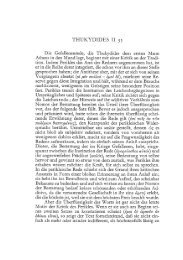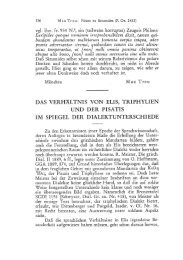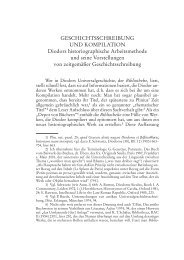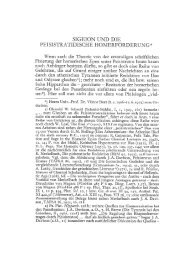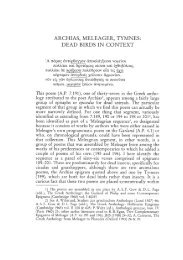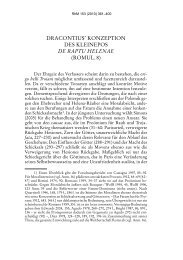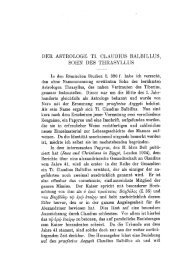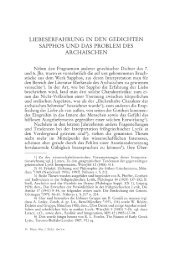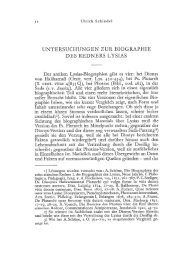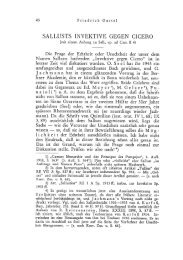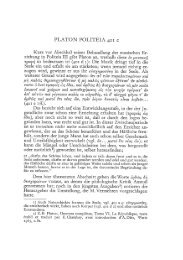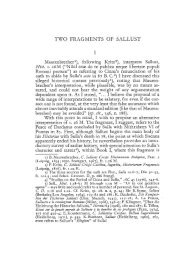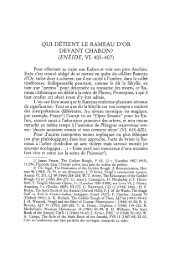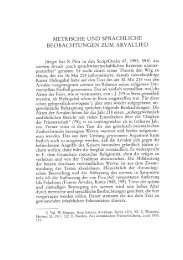VIRGILIO E STESICORO Una ricerca sulla Tabula Iliaca Capitolina *
VIRGILIO E STESICORO Una ricerca sulla Tabula Iliaca Capitolina *
VIRGILIO E STESICORO Una ricerca sulla Tabula Iliaca Capitolina *
Sie wollen auch ein ePaper? Erhöhen Sie die Reichweite Ihrer Titel.
YUMPU macht aus Druck-PDFs automatisch weboptimierte ePaper, die Google liebt.
Suetonius and Augustus’ ‘Programmatic Edict’<br />
Status. Ceausescu argues for the technical character of status<br />
meaning constitution, ‘Verfassung’, comparing Augustus’ letter to<br />
Gaius in A. D. 1 (quoted above under Liceat) and his vow in A. D.<br />
9 after the defeat of P. Quinctilius Varus, vovit et magnos ludos Iovi<br />
Optimo Maximo, si res p. in meliorem statum vertisset (Suet. DA<br />
23.2). 27 Rather, this Suetonian example highlights the key usage for<br />
this passage – in prayer or vow formulae without a constitutional<br />
sense. Livy has five examples of the formula si res publica in eodem<br />
statu . . . in the conditional clause of a vow (21.62.10, 22.9.10, 30.2.8,<br />
30.27.11, 42.28.8) and the acta of the Arval Brethren preserve examples<br />
from A. D. 27 to the 2nd c. A. D. of the formula adapted to<br />
vows to Jupiter Optimus Maximus for the emperor’s safety. 28 It<br />
is not clear whether the formula was originally specific to the<br />
censors’ vow for the well-being of the state or whether it was used<br />
more generally. 29 Denarii minted in 16 B. C., I(ovi) O(ptimo)<br />
M(aximo) S(enatus) P(opulus)Q(ue) R(omanus) V(ota) S(usceperunt?)<br />
Pr(o) S(alute) I(mp) Cae(saris) quod per eu(m) r(es) p(ublica)<br />
in amp(liore) at(que) tran(quilliore) s(tatu) e(st) (BMCRE vol. i.<br />
nos. 91–4) prove for the Augustan period the use of status in public<br />
vows. For consciousness of an etymological link between status<br />
and sistere cf. Cic. Rep. 1.49; such wordplays are a feature of<br />
Roman prayers. The use of status in the political sphere of the Late<br />
Republic is not too different in that it is predominantly general, of<br />
a condition or state of affairs, not a specific constitutional form,<br />
although in philosophical theoretical discussions it can approach<br />
the meaning of ‘state’. 30 During the early principate the term enjoyed<br />
a greater prominence because its vagueness meant that it<br />
could incorporate the changes Augustus instituted. 31 If any allusion<br />
to the language of public vows is rejected or thought to be tangential,<br />
Augustus’ use of such a general term in a delicate political<br />
context remains intelligible (cf. Macr. Sat. 2.4.8: quisquis praesen-<br />
27) Ceausescu (above, n. 2) 348. Cf. Hickson (above, n. 7) 99–100.<br />
28) See J. Scheid, Romulus et ses frères, Paris 1990, 372–4.<br />
29) Ehrenberg (above, n. 9) 107: “status is hardly ever used independently in<br />
a political sense; it means something like condition or state of affairs or constitutional<br />
structure”; cf. J. Christes, Noch einmal Cicero, De Re Publica 1,33,50: eine<br />
Replik, WJA 21, 1996/7, 221 n. 12.<br />
30) Such a use is seen in Cicero’s philosophical works (e. g. Rep. 1.33, Leg.<br />
1.15).<br />
31) See the detailed study by E. Köstermann, Status als politischer Terminus<br />
in der Antike, RhM 86, 1937, 225–40, who cites this edict (229) as evidence.<br />
189


